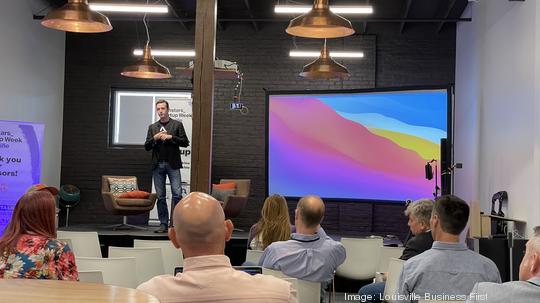
If you missed Louisville Startup Week, you missed out.
The week was packed with tons of speakers, educational sessions and networking opportunities. Several of the speakers and sessions were focused on venture capital, a topic many entrepreneurs have top of mind as they look to raise funds for their business.
I managed to attend a handful of discussions both in-person and online, and thought I'd share a few insights I gleamed from venture capitalists (VCs).
VCs see clear advantages and disadvantages in Louisville
On average, for every exit in the Midwest, investors get five-times the return. That's the highest return rate in the country, Brian Brackeen said.
Brackeen, general partner at Cincinatti-based Lightship Capital, was the keynote speaker at Render Competition on Thursday. He shared that in this region — whether you want to consider it Midwestern or not — it takes about $15 million to generate a $172 million exit.
"If that's the case, where should you build a business?" Brackeen rhetorically asked. "The answer, emphatically, is Louisville."
Rob May, general partner at PJC, an early-stage VC firm in Boston, believes remote work trends can only be beneficial to cities like Louisville. But, he sees issues in talent acquisition and density.
"I think entrepreneurs are realizing that, 'Man, if I'm going to be in San Francisco, I'm going to pay $4,200 for a studio apartment,'" he said. "The problem [with Louisville] is if you have to hire like 60 engineers in the next year that happen to be able to work on blockchain or machine learning, you probably can't do it.
"You need to get this critical mass of expertise here; there's a limited number of people that know the challenges that happen when you take an engineering team from 10 to 150 people in 18 months."
VCs are willing to help you problem-solve — to an extent
Kelli Jones, managing director of Indianapolis-based Sixty8 Capital, said she's used to being "in the trenches" with early-stage founders, even before they raise capital. So, she's always ready to assist the startups she's working with as needed.
It's similar sentiment for Lenore Champagne Beirne, founder and managing partner of Bright Ventures, a New York-based VC firm and accelerator.
"At this point, there's never been a founder request, either personal or professional, that we haven't sought to meet," she said. "Whether it's intros, strategic guidance and collaborations, building financial models or connecting them with mentors, we're very happy to be partnering in those ways."
Jones' and Beirne's firms are unique in the sense that they focus on early-stage companies led by diverse founders. Sixty8, which just announced its $20 million fund earlier this year, invests in Black, Latinx, women and LGBTQ+ led startups specifically.
Mays said its good for early-stage companies with less than five people to have that help and guidance. But once startups reach a certain stage, you have to let them do their own thing.
"I don't like these companies with 60 people that are using VCs like recruiters — that's a skill you have to learn yourself if you're going to be a good company," he said. "It's like, for those of you that have kids, you can't put your kid in a bubble."
VCs have certain expectations for how you intend to use the funding
Every time a startup raises capital and I write about it, I ask: How do you plan to use the money?
Unsurprisingly, investors ask that same question. So in the panel discussion with Jones and Beirne, I asked about what kinds of red flags they look out for when it comes to use of funds.
When Beirne looks through a deck, she wants to understand how startups intend to improve efficiencies.
"You should be improving the system of your business so that as you're scaling, costs are coming down and your capacity is still going up, and you're driving more value in what you're selling," she said. "That's why venture financing isn't the right thing for everybody — for some businesses, efficiency is a much lower level consideration."
Jones said she has seen red flags in startups' finances that have led her to believe what they planned to use the money for was different than what they were telling investors.
"When I'm looking at companies at this stage, if use of funds doesn't at least include adding staff, building out the c-suite or marketing, I'm worried," she said.









